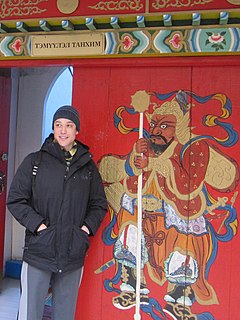A Quote by Toni Morrison
...a habit that had become one of those necessary things for the night... surely a body-friendly if not familiar-lying next to you. Someone whose touch is a reassurance, not an affront or a nuissance. Whose heavy breathing neither enrages nor discusts you, but amuses you like that of a cherished pet.
Related Quotes
On that day, we couldn't reach the conclusion whose hero is the strongest. And today when we are 41 years old, we can protect neither the Earth nor the women we love. We are now just the anti-heroic men, struggling with everyday life. Those boys wo wanted to become heroes... where did they all go? Whose heroes can we become at the end?
From time to time there appear on the face of the earth men of rare and consummate excellence, who dazzle us by their virtue, and whose outstanding qualities shed a stupendous light. Like those extraordinary stars of whose origins we are ignorant, and of whose fate, once they have vanished, we know even less, such men have neither forebears nor descendants: they are the whole of their race.
Atheism can benefit no class of people; neither the unfortunate, whom it bereaves of hope, nor the prosperous, whose joys it renders insipid, nor the soldier, of whom it makes a coward, nor the woman whose beauty and sensibility it mars, nor the mother, who has a son to lose, nor the rulers of men, who have no surer pledge of the fidelity of their subjects than religion.
The soul, when accustomed to superfluous things, acquires a strong habit of desiring things which are neither necessary for the preservation of the individual nor for that of the species. This desire is without limit, whilst those which are necessary are few in number and restricted within certain limits; but what is superfluous is without end.
From person's movement patterns I can tell a lot of things: if pain is in the body, whether someone is depressed, what age they are. When you see someone whose chest is withdrawn, their deltoids are rolled forward. That's someone whose history has broken them, in a sense. You can recognize that movement of pulling away and protecting the heart across all cultures.
If we suddenly plant our foot, and say, - I will neither eat nor drink nor wear nor touch any food or fabric which I do not know to be innocent, or deal with any person whose whole manner of life is not clear and rational, we shall stand still. Whose is so? Not mine; not thine; not his. But I think we must clear ourselves each one by the interrogation, whether we have earned our bread to-day by the hearty contribution of our energies to the common benefit? and we must not cease to tend to the correction of these flagrant wrongs, by laying one stone aright every day.
EMACS could not have been reached by a process of careful design, because such processes arrive only at goals which are visible at the outset, and whose desirability is established on the bottom line at the outset. Neither I nor anyone else visualized an extensible editor until I had made one, nor appreciated its value until he had experienced it. EMACS exists because I felt free to make individually useful small improvements on a path whose end was not in sight.
The American farmer, whose holdings were not so extensive as those of the grandee nor so tiny as those of the peasant, whose psychology was Protestant and bourgeois, and whose politics were petty-capitalist rather than traditionalist, had no reason to share the social outlook of the rural classes of Europe. In Europe land was limited and dear, while labor was abundant and relatively cheap; in America the ratio between land and labor was inverted.
Neither numbers nor powers nor wealth nor learning nor eloquence nor anything else will prevail, but purity, living the life, in one word, anubhuti, realisation. Let there be a dozen such lion-souls in each country, lions who have broken their own bonds, who have touched the Infinite, whose whole soul is gone to Brahman, who care neither for wealth nor power nor fame, and these will be enough to shake the world.
The man whose bosom neither riches nor luxury nor grandeur can render happy may, with a book in his hand, forget all his torments under the friendly shade of every tree; and experience pleasures as infinite as they are varied, as pure as they are lasting, as lively as they are unfading, and as compatible with every public duty as they are contributory to private happiness.







































